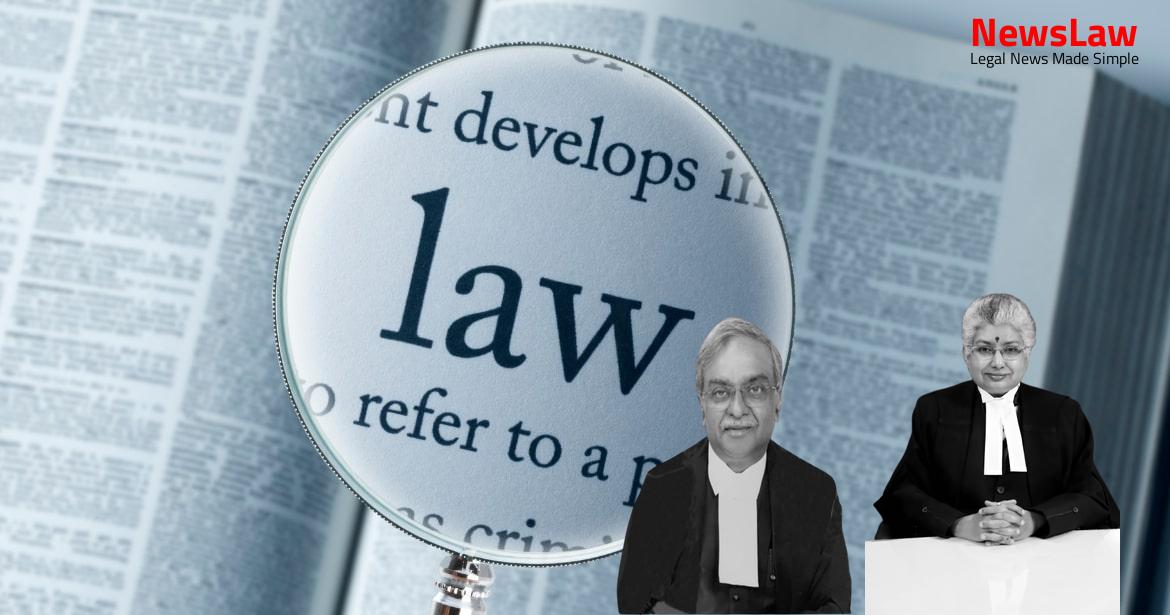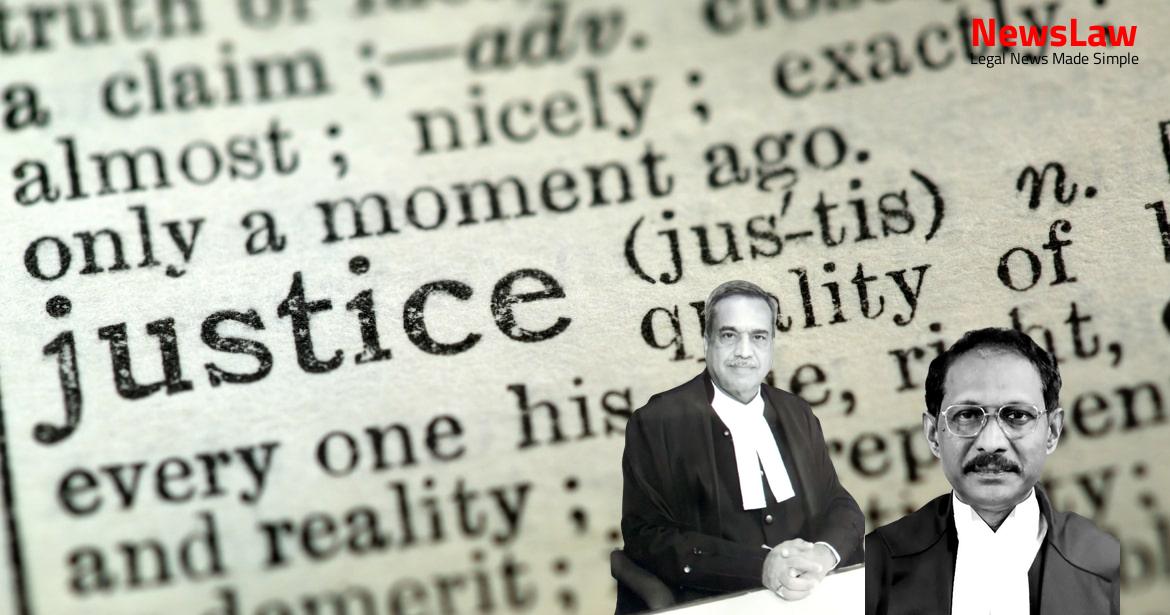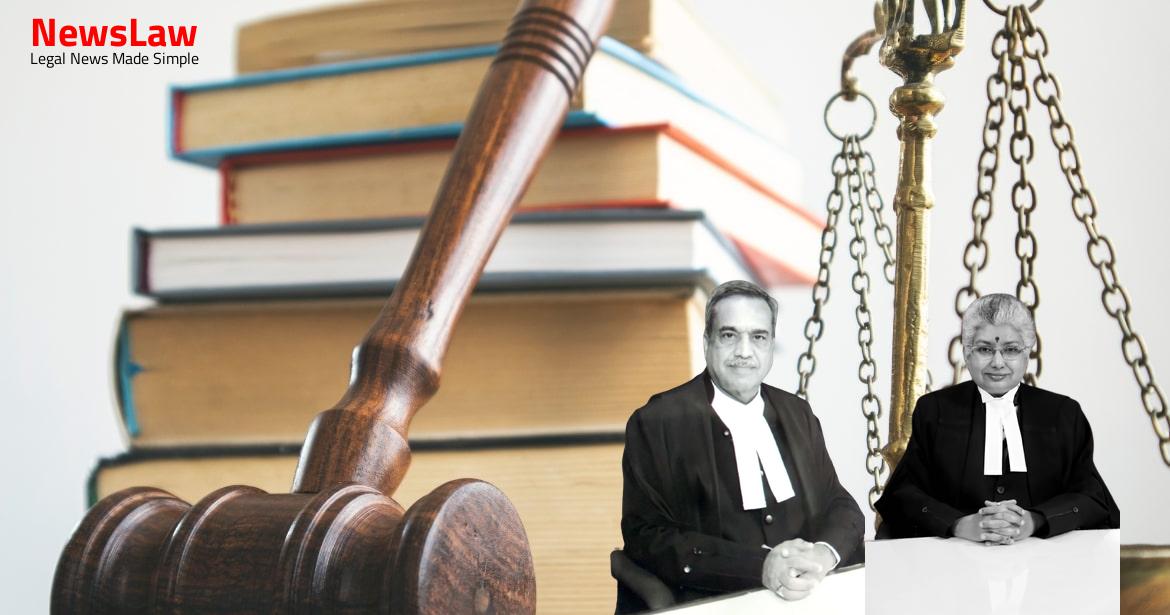In a recent landmark ruling, the Supreme Court of India delivered a judgement in a legal dispute involving Appellant Company and RPIL. The case delved into the nuances of arbitration agreements and compensation claims, setting a crucial precedent for future similar cases. The judgement is a significant step in clarifying the legal framework surrounding such disputes and upholding the principles of justice and fairness in commercial agreements.
Facts
- Appellant Company appointed as clearing and forwarding agent for RPIL for three years.
- Arbitration clause in the agreement dated 01.05.1997.
- Appellant alleged financial loss and loss of goodwill due to respondent’s acts.
- Respondent filed for arbitration under Section 8 of the Act.
- Trial court initially dismissed the arbitration application.
- High Court later allowed the revision petition and referred parties to arbitration.
- The High Court allowed the revision petition and referred the dispute to arbitration.
- The appellant had filed Title Suit No. 241 of 2001 before the merger of RPIL with the respondent, which led to a compromise decree.
- The High Court ruled that under Section 16 of the Act, the arbitrator has the authority to decide on the application of the arbitration clause to the suit.
- It was noted that the appellant acknowledged the existence of the arbitration clause.
- Citing the case of Konkan Railway Corporation Ltd. and Another v. Rani Construction Pvt. Ltd. (2002) 2 SCC 388, the High Court held that the Civil Court does not have jurisdiction to determine the applicability of the arbitration clause to the subject matter of the suit.
Also Read: High Court Acquittal Case of State of Uttar Pradesh v. Jai Prakash
Arguments
- Appellant filed Money Suit No.73 of 2003 due to respondent’s failure to appoint them as stockist causing substantial loss
- Appellant faced unnecessary criminal trial due to respondent’s illegal act resulting in heavy financial and mental loss
- Dispute arises from the contractual agreement that ‘touches upon’ the agreement dated 01.05.1997
- Appellant’s claims include loss from termination of the agreement, failure to be appointed as stockist, loss of goodwill and reputation, mental pressure, and legal proceedings
- Clause 17 of the agreement covers all disputes that may ‘touch upon’ the clauses of the agreement
- Appellant’s claim of Rs.1.40 crores and claims for loss of goodwill and reputation do not directly relate to the agreement dated 01.05.1997
- High Court referred parties to arbitration based on agreement clause and Section 8 of the Act
- Appellant contends the compromise decree in Suit No.241 of 2001 settled the dispute, part of the claim is outside the arbitration clause
- Appellant claims Rs.20 crores compensation for loss of goodwill and reputation
- Respondent challenged the compromise decree on the grounds of inducement and fraud
- The respondent’s counsel argued that the appellant admits the existence of an arbitration clause in the agreement dated 01.05.1997.
- The respondent contends that the issue of compensation for illegal termination of the clearing and forwarding agent agreement falls within the scope of arbitration.
- The respondent did not agree to the appellant’s request to withdraw the termination letter, leading the appellant to file Title Suit No. 241 of 2001 seeking declaration of the contract’s validity.
Also Read: Judgment Review: Supreme Court’s Ruling on the Capital Punishment Appeal
Analysis
- Clause 17 of the agreement contains an arbitration clause
- Any disputes arising between the parties shall be referred to Arbitration Act Bombay
- The arbitration rules of the Bombay Chamber of Commerce will apply
- The competent court in Mumbai has jurisdiction over the matter
- In cases where serious allegations of fraud are made that go to the validity of the contract or the arbitration clause, parties cannot be referred to arbitration.
- When parties have compromised a dispute, the arbitration clause from a prior agreement cannot be invoked in a subsequent dispute.
- Allegations of fraud that taint the compromise decree must be decided by the Civil Court based on evidence.
- The compromise decree in the present case does not contain an arbitration clause.
- The terms of the compromise deed indicated a new agreement replacing the previous one.
- The agreements for appointing as clearing and forwarding agent and as stockist were different, affecting the applicability of the arbitration clause.
- Courts must ensure that the subject matter of the dispute aligns with the arbitration agreement to refer parties to arbitration.
- The court can dismiss an application under Section 8 of the Act and proceed with the suit if the subject matter does not relate to the arbitration agreement.
- Disputes need not directly arise out of the business of the society, but must have reference or relation to the business of the society.
- Claims made in Money Suit No.73 of 2003 related to alleged loss due to termination of the agreement dated 01.05.1997 fall within the ambit of the agreement clause.
- Filing application under Section 8 of the Act should relate to the arbitration agreement or be applicable to the dispute.
- Defendant invoking Section 8 of the Act alleging an arbitration agreement must establish its relation to the suit transaction/contract.
- Serious allegations of fraud or complex issues may necessitate the decision by the civil court instead of arbitration.
- Shutting out arbitration at the initial stage would defeat the purpose of the arbitration agreement.
- Allegations of fraud which are so complicated that they require the civil court for decision.
- Absence of arbitration clause in the dispute between the parties.
- Appellant’s claim for compensation towards loss of goodwill and reputation.
- The judgement does not relate to arbitration but instead addresses the issue of the appellant not being appointed as a stockist.
- The focus is on the compensation claim for the loss suffered by the appellant.
Also Read: Compromise Reached: Reddy Satyanarayana vs Narapureddy Sanyasi Rao
Decision
- The High Court made an error by assuming that the dispute fell under the agreement dated 01.05.1997.
- The appellant-plaintiff did not admit the existence of the arbitration clause.
- The impugned judgment is to be set aside.
- The order of the High Court in Civil Revision (P) No.31 of 2005 is set aside.
- The appeal is allowed.
- Money Suit No.73 of 2003 will be restored to the file of Civil Judge, Senior Division, Kamrup, Guwahati.
- The trial court will proceed with the matter according to the law.
Case Title: ZENITH DRUGS AND ALLIED AGENCIES PVT. LTD. REPRESENTED BY ITS MANAGING DIRECTOR SHRI UDAY KRISHNA PA Vs. M/S. NICHOLAS PIRAMAL INDIA LTD.
Case Number: C.A. No.-004430-004430 / 2009



